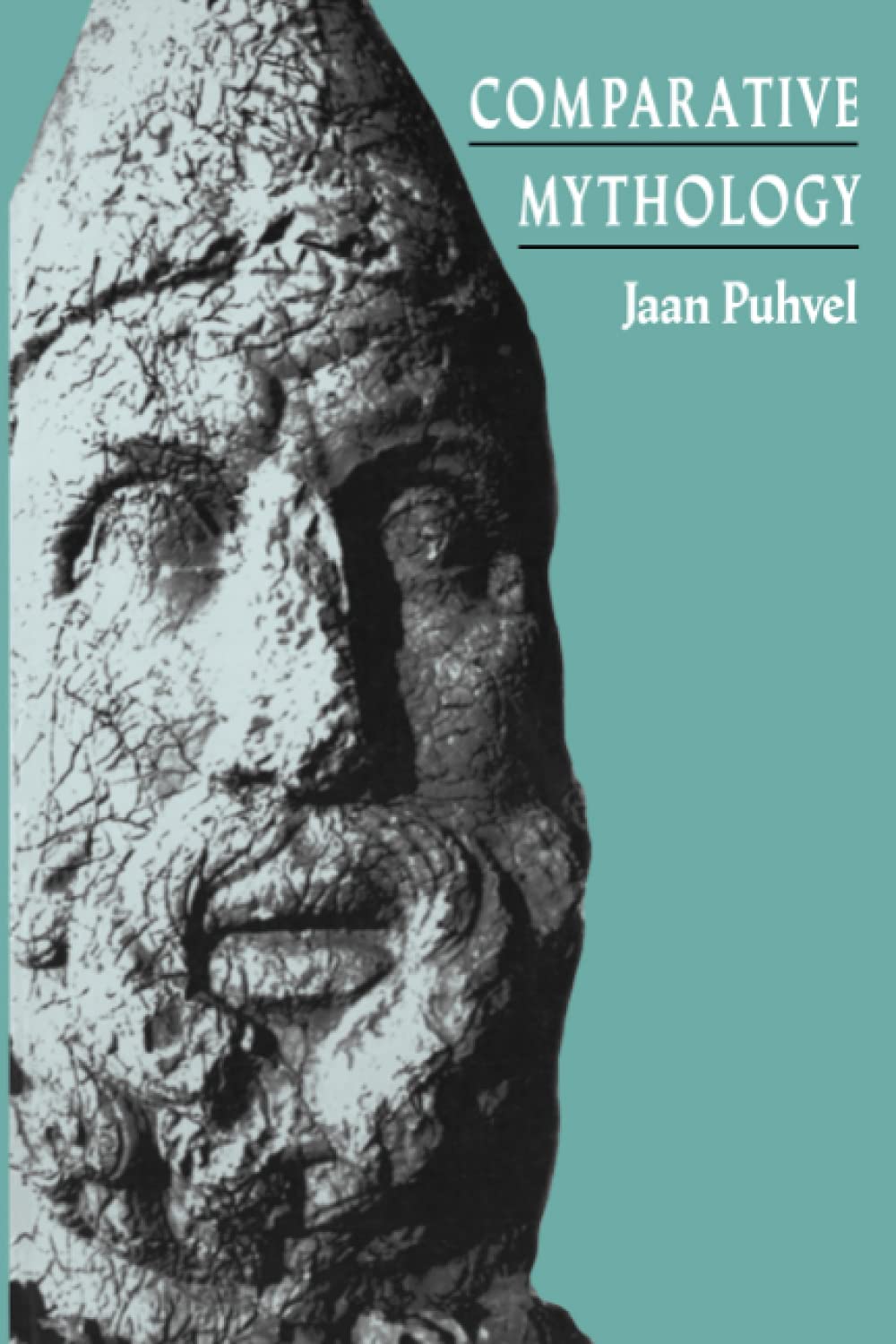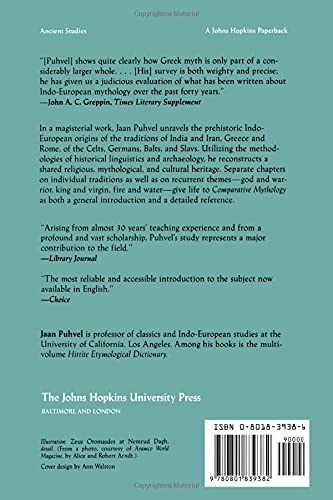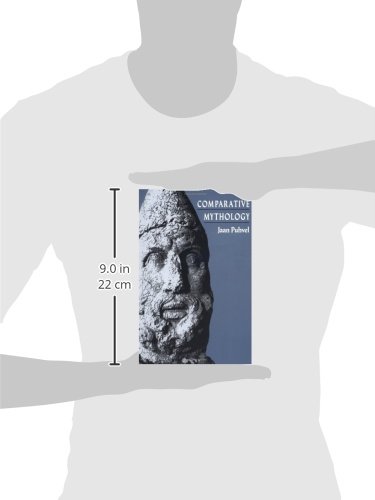



Full description not available
C**S
Useful introduction to Comparative Myth and IE Mythology
This work is an introductory survey of comparative mythology by noted scholar Jaan Puhvel. In this work, he discusses the comparative method and the definitions of the Indo-European and Indo-Iranian culturo-linguistic groups. This is then followed by a brief survey of the mythological material from a comparative perspective. The final part of the book covers common Indo-European themes.This work is extremely interesting and provided new avenues for my own comparative studies. Many themes I have been working on studying have new material presented in this work. The work is so comprehensive that my guess would be that others who look at comparative Indo-European mythological traditions will find new material for their own approapches as well.Highly recommended.
P**E
Solid GREAT SERVICE! Great copy! Happy to GET THIS BOOK!
This is a good book that is solid for the area of study. There is a more expensive book in this area of information which may hold even better knowledge, but this is the one I could afford. I will have to complete reading it to give a more thorough review, but feel after having read some areas of it, that it will provide some well versed writing and research. I will have to get back to you later on if it really turns out that way, however.
S**
Intriguing study of Indo European mythology
Comparative Mythology is just what its title suggests. It is an overview and comparison of the mythic and epic stories of Vedic, Iranian, Greek, Roman, Celtic, Germanic, Baltic and Slavic cultures. It begins with an overview of just what the study of mythology is, a history of that study, and approaches to the study.The overview is interesting as it traces the ups and downs of the study of mythology and details certain ways of studying myth. These include Universal Mythology which seeks to explain mythological accordances and reduce them to basic common levels of human existence, and Diffusionary Mythology which seeks to trace how myths spread over time and geography. The approach of the book itself is explained as monogenesis, "tracing the mythological matter of disparate societies back to a common ancestry, one that includes language, society, and culture alike." The tracing of the cultures mentioned above mean we are trying to reconstruct Indo European myth and perhaps culture with a comparison of myths and epic stories from the cultures spawned from Indo European ethnogenesis.While I give this book very high marks overall, it is obviously the product of decades of scholarship on the part of the author, its construction and content leave much to be desired from the promise of the title. Of its 290 pages only 50 comprise actual comparative essays on the themes of God and Warrior, King and Virgin, Horse and Ruler, Fire in Water, and Twin and Brother. While the previous bulk of the text separately covers the various myths and epics of the aforementioned named cultures, with a little comparison woven in along the way, there could be more of the "Comparative" versus the "Mythology."These themed essays are where the book really picks up steam. But, the author seems to me to choose obscure ideas to trace along the comparative lines. I was quite disappointed that there wasn't more, for instance, on cosmogony and anthropogony, the creation of the universe and mankind, and eschatology, the end (and sometime regeneration) of the world, as well as post-death experience. These, after all, are the most basic questions man ponders "Where did I come from?" and "Where am I going after here?". Historically, science has been able to do little to none to answer these questions and they have then fallen under the religious purview. While it can be argued that not every IE culture has left us with creation myths, for instance, even the author argues that epic stories of urban foundations (i.e. Rome) often contain inklings of the original myth if we study them carefully enough.I also think the author could have chosen some more basic subjects for comparison. While the study and comparison of myths about, for example, the creation and sanctification of kings and the accompanying horse sacrifices, was interesting enough, I would have enjoyed more comparisons on gods and goddesses as they fulfilled specific roles such as water deities, smiths, fertility gods, etc.In closing, though, I did find this book highly enjoyable, and while a challenge to read, being written at a somewhat advanced level, it was written with clear prose and just enough linguistics to illustrate points without being overly complicated. This book is clearly a must read and one that I highly recommend.
E**N
Five Stars
Thank You
S**L
Five Stars
good
L**T
Very esoteric!
I've never enjoyed the reading (or hearing) of myths, regularly involving so many things to me displeasingly counterintuitive, and downright impossible. Nevertheless, I was interested in reading this book for its prospective value in making cogent inferences about Indo-European origins and relationships. As a non-philologist, non-mythologist, I was expectably at the mercy of the esteemed author, and utterly unable to form any semblance of an independent opinion about Puhvel's assertions and inferences. The phonetic transcriptions of terms from the various Indo-European languages will be rather opaque to non-specialists in historical-comparative linguistics, and the constellations of mythic personages/beings will boggle all minds comparable to mine. At a minimum, I have to give Puhvel credit for some flair of expression amid the onslaught of things arcane: in scoffing at notions of the universality of Greco-centric myths, he asks why exponents insist on seeing a Greek mythologem in Southwestern American Kokopelli, rather than a coyote god in ancient Greece; and in speaking of Irish monks belatedly taking up the written word, he tells us that they "scribbled all over western Europe". To the layman, Puhvel's ready correlations among Indo-European groups more often than not seem less than apparent (he seems rather unreluctant to make allowance for no end of deviation in various details); but this is not practiced blandly across the entire spectrum of individuated cultures: the Greek and Hittite mythologies, for example, are cited as much modified by substratal and adstratal influences. In the end, I must confess to feeling more agog than informed; but then, I have experienced as much before in daring to crack a graduate-level organic-chemistry text. To a dyed-in-the-wool mythologist, this is probably ambrosia. [Footnote: Rare is the serious book that does not impart at least a couple of edifying oddments to this reader or that, even if indirectly. Reading this book caused me to (once again) look up the dictionary definition of "naphtha" (presumed, incidentally, to be a principal ingredient of the famous "Greek fire" of the Byzantines), and there I find its Persian root in "neft", which (I by chance happen to know) is identical with the Russian word for petroleum. Azerbaijan, situated between Iran and Russia, of course sports a lot of petroleum, including natural seeps that were evident to the ancients.]
P**S
mythologie
très bien
B**F
Sehr lesenswert
Ein interessantes Buch, dass sich ausführlich mit den verschiedenen indoeuropäischen Kulturen auseinandersetzt. Es hat Spaß gemacht, dieses Buch zu lesen und zu vergleichen, selbst wenn man nicht immer seiner Meinung sein muss.
C**N
gleaming wit in varied strata of knowlege and thought
Jaan Puhvel writes with a terse academic style that would be dry, if it were not for his ironic wit which occasionally gleams in his laconic prose. It makes this book , which to a non-specialist seems dense, an enjoyable and informative excursion into new territory. It has been useful in informing my interests in myth and in Indo-European origins, assisting with the crystallising of ideas about both. I found very interesting and illuminating Puhvel's synthesis of the ideas of Vikings, Celts, Romans, Greeks and Vedas in a way which to my mind I found plausible in illuminating some of the great blanks of ancient Europe. Some ideas I found tending towards generalisations that become just too vague to be really meaningful, but my own knowledge of Welsh and Brythonic culture was startlingly complemented by insights elsewhere. I found it very useful in considering notions of deity in antiquity generally, and how mythology functions in communities, and how cultures interact and change with their shifting priorities . I think it will work well as a primer and introduction to these things in general, and a good source and beginning to further study. It makes the actual hypothetical proto-Indo-European community seem very distant and alien indeed, when one considers that the Vedas are little more ancient than Homer. All very interesting, in an excellent book.
C**Y
clear and straightforward
A most useful introduction to a large and complex subject. I only wish its content was properly referenced - the reader has to take things very much on trust.
Trustpilot
1 month ago
5 days ago